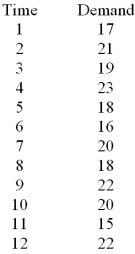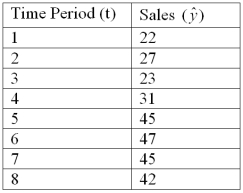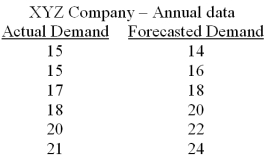Exam 16: Time Series Forecasting
Exam 1: An Introduction to Business Statistics54 Questions
Exam 2: Descriptive Statistics: Tabular and Graphical Methods90 Questions
Exam 3: Descriptive Statistics: Numerical Methods149 Questions
Exam 4: Probability135 Questions
Exam 5: Discrete Random Variables128 Questions
Exam 6: Continuous Random Variables150 Questions
Exam 7: Sampling and Sampling Distributions116 Questions
Exam 8: Confidence Intervals144 Questions
Exam 9: Hypothesis Testing148 Questions
Exam 10: Statistical Inferences Based on Two Samples132 Questions
Exam 11: Experimental Design and Analysis of Variance115 Questions
Exam 12: Chi-Square Tests96 Questions
Exam 13: Simple Linear Regression Analysis148 Questions
Exam 14: Multiple Regression122 Questions
Exam 15: Model Building and Model Diagnostics102 Questions
Exam 16: Time Series Forecasting150 Questions
Exam 17: Process Improvement Using Control Charts122 Questions
Exam 18: Nonparametric Methods97 Questions
Exam 19: Decision Theory90 Questions
Select questions type
A positive autocorrelation implies that negative error terms will be followed by _________ error terms.
(Multiple Choice)
4.9/5  (33)
(33)
A univariate time series model is used to predict future values of a time series based only upon past values of a time series.
(True/False)
4.8/5  (37)
(37)
Consider the following data:  Calculate S1 using simple exponential smoothing and = 2.
Calculate S1 using simple exponential smoothing and = 2.
(Multiple Choice)
4.9/5  (38)
(38)
Consider the regression equation  and the data below:
and the data below:  Compute the predicted value for sales for period 6 and 7.
Compute the predicted value for sales for period 6 and 7.
(Essay)
4.8/5  (36)
(36)
If the errors produced by a forecasting method for 3 observations are + 3,+ 3 and - 3,then what is the mean squared error?
(Multiple Choice)
4.9/5  (36)
(36)
Trend refers to a long-run upward or downward movement of a time series over a period of time.
(True/False)
4.9/5  (38)
(38)
The ________ index is a weighted aggregate price index that uses the base period quantities as weights in all succeeding time periods.
(Multiple Choice)
5.0/5  (42)
(42)
 Based on the information given in the table above,we can conclude that in general the forecasting method is:
Based on the information given in the table above,we can conclude that in general the forecasting method is:
(Multiple Choice)
4.7/5  (40)
(40)
When the moving average method is used to estimate the seasonal factors with quarterly sales data,a ______ period moving average is used.
(Multiple Choice)
4.8/5  (35)
(35)
In general,the number of dummy variables used to model constant seasonal variation is equal to the number of
(Multiple Choice)
4.8/5  (30)
(30)
Showing 141 - 150 of 150
Filters
- Essay(0)
- Multiple Choice(0)
- Short Answer(0)
- True False(0)
- Matching(0)